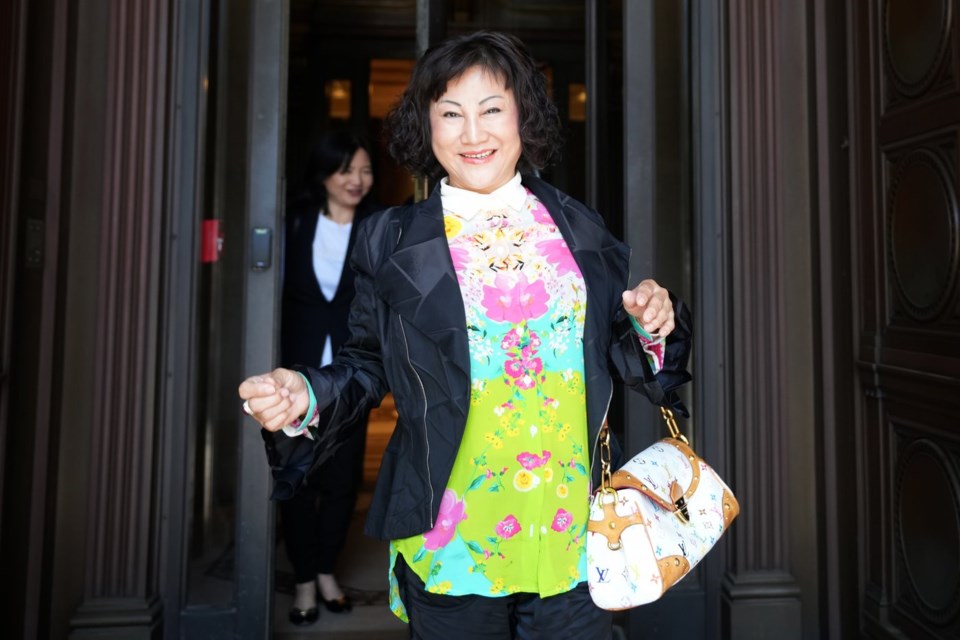TORONTO — Hudson’s Bay and one of its top lenders are accusing landlords of having "ulterior motives" for opposing a push to sell 25 leases to a B.C. billionaire.
In new court documents filed late Thursday, the defunct department store and lender Pathlight Capital LP argue that landlords don’t want Ruby Liu to buy the Bay leases because they’d rather have the properties returned to them to fill or redevelop as they wish.
The "strenuous campaign" the landlords are mounting against Liu is all about "securing certain extraneous benefits for themselves" rather than filling their properties and helping the Bay repay creditors, said the U.S. private credit investment manager still owed more than US$68.5 million.
The accusations form the latest salvo in a battle that has broken out between the Bay and the owners of the highly desirable properties it presided over for much of its 355-year-old history.
When the Bay collapsed under the weight of debt in March and had to file for creditor protection, it wound up liquidating all 80 of its stores and 16 more occupied by its sister Saks brands to recoup cash for creditors.
Then, it followed the standard path of selling assets, including its leases, to recoup as much cash for its lenders as possible. Some 12 bidders went after a collective 39 leases. B.C. billionaire Ruby Liu's Central Walk business was chosen by the Bay to buy the bulk of them.
Liu scooped up three at B.C. malls she owns for a collective $6 million, with the deal quickly getting court approval. The remaining 25 she wants to buy for $69.1 million — and her plan to turn them into department stores filled with entertainment, dining and recreational spaces — have been hotly contested.
Landlords say Liu should not be able to move in because the leases don't allow for many of her intended uses and her business plan is unrealistic within the short timelines she estimates needing. They also say she is not backed by the kind of cash or experience required to launch and run a new department store.
Pathlight claims the landlords are objecting to Liu because they'd rather the leases be disclaimed — a standard business procedure that sees properties turned back over to owners when the previous tenant finds no one willing or suitable to take over the lease.
Landlords were able to bid on their own leases. The move would have helped them avoid a court forcing them to accept a tenant under the lease terms the Bay had. The department store was the anchor tenant in many properties and thus, had lower rents than the average retail occupant pays.
No landlords bid on their own leases.
"One could therefore reasonably assume that the objecting landlords’ objections have less to do with Central Walk itself, or any actual desire to find another department store they deem more suitable to act as a new anchor tenant, and more to do with securing a means to reacquire their leases at no cost to themselves and with no value flowing to the applicants’ estate," Pathlight said in court documents.
If they got control of their properties back, Pathlight argues landlords would be free of lease restrictions which limit how their spaces can be used.
It said several of the objecting landlords have plans to redevelop the Bay properties for commercial, office, residential and recreational uses.
The Bay agreed with Pathlight's arguments.
In its own submission, it pointed out the leases Liu wants represent hundreds of millions of value and "a variety of concessions" that cannot be accessed by the objecting landlords while the Bay's leases are in effect.
The retailer charged that the landlords always had designs to reject Liu and pointed out they have confirmed such. In court filings and cross-examinations the Bay said landlords have admitted "they would never agree to assign their leases to the purchaser – no matter what business plan" Liu presented.
"One of the objecting landlords (QuadReal) did not even take a meeting with the purchaser despite repeated requests," the Bay wrote.
Liu's own filing made the same point and listed a number of ways she had been spurned by landlords. She alleged some told her they already had redevelopment plans, others attacked her credibility and one ended an initial meeting with her after 10 minutes and refused follow-ups.
A court will hear these arguments next week at a hearing meant to determine whether Liu should be able to buy the leases.
The landlords have the support of the court monitor — a third party that is overseeing the creditor protection case — and another Bay lender, ReStore Capital.
ReStore has complained that the longer the Liu deal goes by without court approval, the more futile its hopes of recovering what it is owed become.
At this point, ReStore estimates it will receive $12.5 million in proceeds if the Liu deal goes through, much less than if the deal had already gone ahead. That compares with $11.7 million of its collateral ReStore says it has spent on rent between June and the end of August, plus tens of millions of dollars in professional fees, while the transaction awaited approval.
ReStore said the Bay has "spent excessively" to "achieve nothing but a net reduction in (its) projected recovery." Corporate payroll and benefits have expanded by over 185 per cent or $18 million and professional fees for the Bay and monitor have increased over 250 per cent, or by an additional $29 million, for a total of $41 million, ReStore said.
This report by The Canadian Press was first published Aug. 22, 2025.
Tara Deschamps, The Canadian Press




